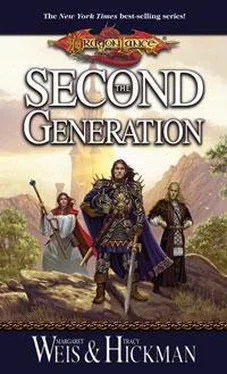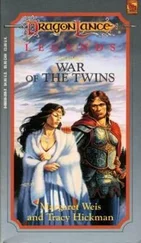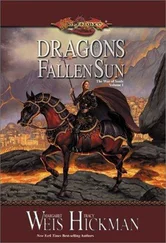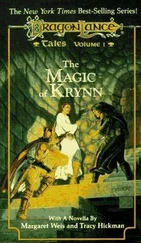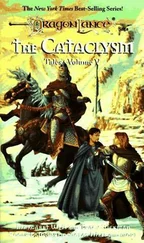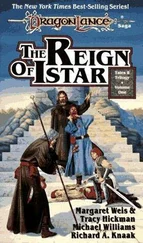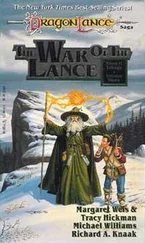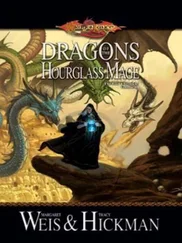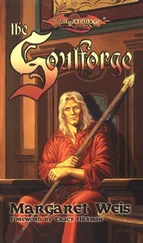Margaret Weis - The Second Generation
Здесь есть возможность читать онлайн «Margaret Weis - The Second Generation» весь текст электронной книги совершенно бесплатно (целиком полную версию без сокращений). В некоторых случаях можно слушать аудио, скачать через торрент в формате fb2 и присутствует краткое содержание. Жанр: Фэнтези, на английском языке. Описание произведения, (предисловие) а так же отзывы посетителей доступны на портале библиотеки ЛибКат.
- Название:The Second Generation
- Автор:
- Жанр:
- Год:неизвестен
- ISBN:нет данных
- Рейтинг книги:5 / 5. Голосов: 1
-
Избранное:Добавить в избранное
- Отзывы:
-
Ваша оценка:
- 100
- 1
- 2
- 3
- 4
- 5
The Second Generation: краткое содержание, описание и аннотация
Предлагаем к чтению аннотацию, описание, краткое содержание или предисловие (зависит от того, что написал сам автор книги «The Second Generation»). Если вы не нашли необходимую информацию о книге — напишите в комментариях, мы постараемся отыскать её.
The Second Generation — читать онлайн бесплатно полную книгу (весь текст) целиком
Ниже представлен текст книги, разбитый по страницам. Система сохранения места последней прочитанной страницы, позволяет с удобством читать онлайн бесплатно книгу «The Second Generation», без необходимости каждый раз заново искать на чём Вы остановились. Поставьте закладку, и сможете в любой момент перейти на страницу, на которой закончили чтение.
Интервал:
Закладка:
“No, Markus, you may be off to the Boar’s Head for your nightly carousing with your friends.” Jenna grabbed a broom and began briskly sweeping the floor.
“They’re just kids,” Mark said scornfully, his eyes following her every move. “I’d much rather stay and help you clean up.”
Jenna brushed dried mud and a few scattered mint leaves out the door, and brushed Markus playfully along with them. “There’s nothing you can do for me in the shop, as I’ve told you. Best for both of us if you keep out of it. I don’t want your blood on my hands.”
“Mistress Jenna, I’m not frightened—” he began.
“Then you have no sense,” she interrupted, with a smile to take away the sting of her words. “Locked in that case is a brooch that will steal away your soul and take you directly to the Abyss. Next to the brooch lies a ring that could turn you inside out. See those spellbooks on the far shelf? If you were to so much as glance at the inscriptions on the covers, you would find yourself descending into madness.”
Markus was somewhat daunted, but didn’t intend to show it. “Where does it all come from?” he asked, peering into the shadowy shop.
“Various places. That White Robe who just left brought me the brooch of soul-stealing. The brooch is evil, you see, and she would never consider using it. But she traded the brooch to me for several spellbooks that she has long wanted, but could not afford. You remember the dwarf who came this morning? He brought these knives.” Jenna gestured to a display case in which innumerable small knives and daggers were arranged in a fan leaf design.
“Are they magic? I didn’t think mages were permitted to carry weapons.”
“We may not carry swords, but knives and daggers are permissible. And, no, these are not magic, but the dwarves make many items that can later be imbued with magic. A wizard might cast a spell on one of these knives, if he chose to do so.”
The young man said stoutly, “You’re not afraid, Mistress Jenna. Why should I be?”
“Because I know how to handle such arcane objects. I wear the Red Robes. I have taken and passed the Test in the Tower of High Sorcery. When you do the same, then you may come into my store. Until then,” she added, with a charming smile that went to the young man’s head like spiced wine, “you stand guard at my door.”
“I will, Mistress Jenna,” he promised rapturously, “and... and maybe I will study magic ...”
She shrugged and nodded. All her assistants said the same thing when they first came to work for her; none of them ever followed through. Jenna made sure of that. She never hired anyone who had the slightest proclivity toward magic. Her wares would be too strong a temptation for a young mage to resist. Besides, she needed brawn, not brain, to guard her door.
Only those who wore the robes and the few tradesmen who dealt in arcane merchandise were permitted to enter Jenna’s shop, its doorway marked by a sign with three moons painted on it: the silver moon, the red, and the black. Magic-users drew their powers from these moons, and the few stores in Ansalon that dealt in mageware always marked their shops with these symbols.
Most citizens of Palanthas avoided Jenna’s shop; many, in fact, crossed the street to walk on the other side. But there were always a few—either curious or drunk or acting on a dare—who attempted to enter. And, of course, kender. Not a day passed but that Jenna’s assistant had to strong-arm, throttle, or otherwise remove the light-fingered kender from the premises. Every mage in Ansalon knew the story of the Flotsam mageware shop. It had vanished under mysterious circumstances, never to reappear.
Horrified eyewitnesses reported having seen a kender enter just seconds before the entire building winked out of existence.
Markus shuffled off disconsolately down the street, to drown his unrequited love in ale. The fabric merchant next door to Jenna locked his door, then bowed to her in respect as he passed by on his way home. He had not been pleased when she had first moved in next door, but when his sales—particularly of white, black, and red cloth—increased, his protests decreased proportionately.
Jenna wished him a good evening. Stepping inside her shop, she shut her door, locked it, and placed a spell of warding on it. She lived above the shop, keeping her own guard on her wares during the night. Casting a final glance around, she mounted the stairs that led to her quarters.
A knock on the door halted her.
“Go home, Markus!” she called out irritably.
Three nights ago, he had come back to sing love songs beneath her window. The incident had been most embarrassing.
The knock was repeated, this time with more urgency. Jenna sighed. She was tired and hungry; it was time for a cup of tea. She turned, however, and went back down the stairs. Owners of Three Moon Shops were expected to open their stores to any mage at need, no matter what time, day or night.
Jenna opened a small window set into the door and peered out, expecting to see a Red Robe, humbly apologizing for disturbing her, but could he possibly have some cobweb? Or a Black Robe, imperiously demanding bat guano. Jenna was startled and displeased to find two tall and heavily cloaked and hooded men standing on her stoop. The rays of the setting sun glinted on swords, which both wore on their hips.
“You have the wrong shop, gentlemen,” Jenna said in excellent Elvish.
By their slender legs, expensive, well-tooled leather boots, and fancifully designed leather armor, she guessed them to be elves, although their faces were hidden in the hoods of their cloaks.
She was about to slam shut the window when one of the men said, speaking halting Common, “If you are Jenna, daughter of Justarius, head of the Wizard’s Conclave, we do not have the wrong shop.”
“Suppose I am Jenna,” Jenna replied haughtily, though she was now extremely curious. “What do you want of me? If you have a magic item to sell,” she added, as an afterthought, “please return in the morning.”
The two men glanced at each other. She could see the glitter of almond-shaped eyes in the shadows of their hoods.
“We want to talk to you,” said one.
“Talk away,” Jenna said.
“In private,” said the other.
Jenna shrugged. “The street is deserted this time of day. I don’t mean to be rude, but you must know that owners of Three Moon Shops are careful about who they let into their shops. If s for your safety more than mine.”
“Our business is serious, not to be discussed on the street. Believe me, mistress,” the elf added, in a low voice, “we like this no more than you do. You have our word that we will touch nothing!”
“Did my father send you?” Jenna asked, playing for time.
If Justarius had sent them, he would have told her first, and she’d had no word from him in months, ever since their last quarrel. He strongly disapproved of her lover.
“No, mistress,” said the elf. “We come on our own.”
Odd, Jenna thought. One of the elves is Qualinesti, the other Silvanesti. She could tell the difference by their accents, though probably no other human in Solamnia could have done so. But Jenna had spent a great deal of time around elves, one elf in particular.
Long, long ago, the elves had been one nation. Bitter wars, the Kinslayer War, had divided them into two, Qualinesti and Silvanesti. Neither nation had any love for the other. Even now, after the War of the Lance had united every other race on Ansalon, the two elven states—though ostensibly one—were, in reality, farther apart than ever.
Her curiosity aroused, Jenna opened her door and stepped back to permit the elves to enter. She wasn’t the least bit fearful. They were elves, and that meant that they were upstanding, law-abiding, and good to the point of boredom. Plus, she had a spell on her lips that would blow them back out into the street if they tried anything.
Читать дальшеИнтервал:
Закладка:
Похожие книги на «The Second Generation»
Представляем Вашему вниманию похожие книги на «The Second Generation» списком для выбора. Мы отобрали схожую по названию и смыслу литературу в надежде предоставить читателям больше вариантов отыскать новые, интересные, ещё непрочитанные произведения.
Обсуждение, отзывы о книге «The Second Generation» и просто собственные мнения читателей. Оставьте ваши комментарии, напишите, что Вы думаете о произведении, его смысле или главных героях. Укажите что конкретно понравилось, а что нет, и почему Вы так считаете.
